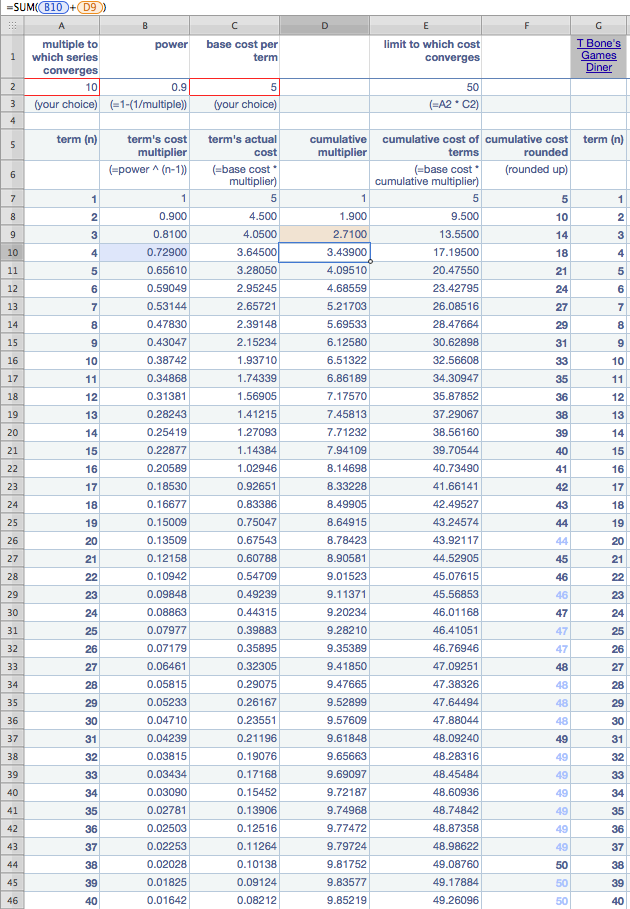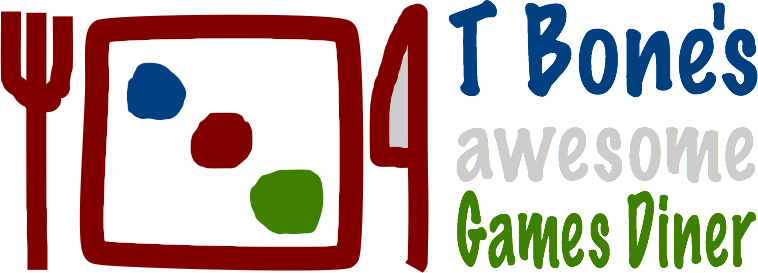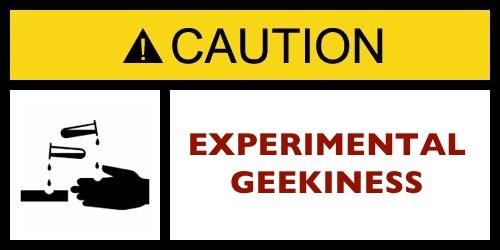If fluency in a foreign tongue costs your character 5 points, how much should fluency in ten languages cost?
In the midst of recent email correspondence about ESCARGO, I’ve dredged up a game design topic long of interest to me: a decreasing cost scale for multiple instances of traits.
Wait – is there some reason why ten 5-point languages should cost the PC less than 50 points? And isn’t ESCARGO all about increasing the cost for more stuff? Let me explain:
Depth vs breadth
Many a game designer (or just dedicated hacker) has pondered the topic of breadth vs depth in character skills. (Some of the below could be adapted toward other traits too, like leveled powers, but I’ll stick to skills here.) There’s probably a lot of good punditry on the topic out there that I’m unaware of; drawing only on my limited musings and past conversations, I attach breadth to how much area a skill covers, and depth to how well the character knows, or is effective within, that area. Or moving closer to game terms, breadth is covered by a skill’s description of its scope (or by a common-sense understanding of what is and isn’t covered by “Astronomy”), and depth is covered by the skill’s rank (whether numerical “level”, descriptive term like “Excellent”, or whatever the system uses).
Games typically address depth in all the detail you’d want – which isn’t much, really. Some systems might offer skills as a binary “you got it or you don’t” switch, which won’t satisfy enthusiastic character designers. Most systems are more accommodating, with the ability to purchase a desired level of skill. Nothing fancy is needed; just by picking a level, players can make the character a laughable novice or an awesome master, or anything in between, where Astronomy or Knife Throwing is concerned. All fine and good.
Breadth, though, isn’t something you’ll see addressed with such a freely-set measure. A system will pre-package the breadth of skills, establishing that combat skills consist of Sword and Knife and Shield and so on, and scientific skills consist of Astronomy and Chemistry and Physics and what not. There may be limited options to tweak breadth, such as ways to learn smaller subsets of those skills, or to lump them into broader Hand Weapon or Science skills. But they’re typically coarse tools. In GURPS, for example, subsets of combat skills (“techniques”) let you boost skill depth within a narrow breadth, though under a restrictive cost scheme: Although a skill may offer a dozen or two techniques, you’re throwing away points if you improve more than three. (And techniques still don’t let you narrow a skill’s breadth below its starting point; you buy the skill with all of its techniques in place, whether you want them or not.) In the other direction, super-broad “Wildcard” skills help pare down the game’s super-long lists of PC skills, though they only replace the normal skill scheme with the very optional ruling “take any reasonable bunch of skills for the price of three”.
Many systems won’t even have those tools in place. Adjusting breadth of ability in these simply means buying more skills: buy a master level in all those individual hand weapon skills, and you can claim the equivalent of the weapon mastery your character concept calls for. Alternately you can look for workarounds, like a “science talent” trait that boosts your level with all science skills, including the dozen that you wanted for your “master of all sciences” character but couldn’t afford to actually buy. Or a “weapon master” trait that replaces the unaffordable goal of skill in all weapons with an alternate mechanism for getting similar effects.
Those patches are better than nothing, but they still don’t let you flexibly price and buy an exact degree of breadth, using the intuitive tools of real skills and normal mechanics. If you really want to achieve that, here are ideas:
Pricing breadth
First, how to price depth of a skill? Your game will already answer that, whether it’s a flat number of points per level, or some tweak on that concept. (As a side tangent, ESCARGO provides a what-if look at the benefits of an ever-increasing cost per level of depth. Yet as discussed here, I like point costs to represent utility of traits, and I can see good arguments both for increasing utility per level and for decreasing utility per level. In the end, whether a game puts skill depth on a decreasing, flat, or increasing cost per level, I can probably find reason to like it.)
Which brings us back to the article’s opening: How to price breadth? That’s obviously a necessary question if you’re designing skills with breadth that can be smoothly “dialed” in or out (from, say, Finding Food in Deserts, to All-Round Survival in Deserts, to All-Round Survival Anywhere). But it’s also a good question if you’re only allowing for breadth via purchase of multiple skills. Those earlier-mentioned language skills demonstrate why.
A language costs 5 points in our example, two languages cost 10, and so on. What’s wrong with that? Well, if you establish point cost as a measure of utility, you have to ask: Are ten languages actually ten times as useful as one? Does 50 points make sense as the cost for a spy’s über-linguist ability, a cost on par with many superpowers in your game? And just how many languages are there, anyway? If magic or super-tech allows a near-“universal translator” ability like C-3PO’s, isn’t hundreds or thousands of points for the ability a wee ridiculous?
There are workarounds. A rather elegant start is to admit that while there are 4,630,000+ languages in the galaxy, only, say, five will ever matter in the game. Tell the protocol droid to buy five languages (and maybe a sixth that generously covers “all the rest”). Or just create a Universal Translator trait for 25 points or whatever you think it’s worth. All squared away, right?
Well… The “there are effectively only five languages” idea isn’t so great if you want to leave the stage open for any number of tongues to make walk-on appearances. And the Universal Translator approach hands a raw deal to the non-droid PC whose concept calls for a half-dozen or more languages learned the old-fashioned way – that is, one individual skill at a time. She can end up paying more for her handful of tongues than does the droid who gets them all!
Finally, even if you think the matter is easy to solve (or just not interesting) for languages, how about the PC who wants all weapon skills? Or all science skills? All influence skills? Is a hodge-podge of workaround traits, alternate skill systems, and arbitrary point caps the only way to allow varied breadth in these areas without astronomical point costs? Or are there ways to smoothly price varying degrees of breadth in any skill area?
Two number-crunchy approaches
Let’s look for a moment at reducing the cost for breadth that’s built by using multiple skills. A sensible approach to avoiding a sky-high final cost would seem to be a decreasing cost per added skill: normal cost for the first skill, decreasing cost for each additional skill. What’s left is the how-to.
Square root method
Instead of multiplying cost per skill by number of skills, you could multiply cost per skill by some root of the number of skills. Take the ever-popular square root. Multiply the 5-point cost of a language by the square root of the number of languages, and there you go: one language costs 5 points, two languages cost about 7 points (5 x square root of 2), three languages almost 9 points, and so on. Or to keep costs really simple, tell players they can buy one language for 5 points, four languages for the cost of two (10 points), nine for the cost of three (15 points), and so on.
How would that work for multiple languages at different levels of depth? Let’s say that in a game system, 5 points buys very basic proficiency in a language, medium proficiency is another 5 points, and fluency another 5 points. Using the preceding simple example, say the PC buys nine languages at basic level for 15 points. He can then buy medium proficiency for four of those, for another 10 points. And to boost one of those up to fluency, he pays 5 points. You’ll have to work out details for the system you use, but the method should make breadth more affordable for everything from weapon skills to sciences, while still allowing depth to vary among specific skills.
Drawbacks? One comes to mind: The square root of an open-ended value is still open-ended. That is, there’s no upper bound; at some large but finite number of languages, the cost will still rise above that of the omnifluent Universal Translator trait, up to infinite cost if there are infinite languages. That’s probably not at all a practical problem, but it does fail to neatly answer the question “How much for everything?” when you don’t have a finite count of that “everything”.
Zeno’s method
What if your first language costs full price, your next one 1/2 that, your next one 1/4 that, your next one 1/8 that, and so on? The result is a convergent series. The total rises with each added term (i.e., skill or other item), but doesn’t rise to infinity; it converges toward, but never quite reaches, a finite limit.
A convergent series sounds perfect for pricing unlimited (or at least undefined) breadth: No matter how many skills you buy, the cost still falls short of a given theoretical cost for infinite skills. In the above series, which is inspired by the famous paradoxes of Greek philospher Zeno, total cost never reaches twice the cost of the first skill – i.e., for our 5-point languages, it always falls short of 10 points (hitting 10 if you round up, of course). Which, actually, doesn’t sound like what we want for languages or any skills: one skill for the price of one, infinite skills for the price of two? Hm. Fortunately, we can change the workings to more useful ends.
For a series that converges to x (i.e., x times the cost of one skill), you start with (base skill cost) * (1-(1/x))^0 (which equals 1), meaning an unchanged base cost for the first skill. Then multiply base skill cost by (1-(1/x))^1 for the second skill, by (1-(1/x))^2 for the third, (1-(1/x))^3 for the fourth, and so on. The formula for each new skill’s cost is (base skill cost) * (1-(1/x))^(n-1), where n is the skill’s number in the series.
It’s not as complex as I may clumsily make it sound; I welcome better wording suggestions from readers. A spreadsheet should make it all simple for anyone. Set it up like this (or see download links at article end):

Fill in the two red cells however you like. The first cell is the multiple you want costs to converge to (10 times the cost of one skill, in my sheet’s example), and the other is the base cost per skill (5 points, using my language example). From there, the useful columns become C, the cost of each added term; and E, the cumulative cost of terms. (Column F does the cost rounding for you; Column G repeats the term number for ease of reading.)
So in this example, the third language costs just over 4 points (Column C), and the ninth, just over 2 points; three languages cost 14 points (Column E or F) and nine languages cost 31 points. But as you can see, the cost of an added skill never technically approaches 0 points, and the total cost never quite reaches 50 points.
With rounding, of course, total cost does reach 50. Rounding up, it’s unavoidable that 38 languages cost you 50 points, the same as infinite languages. Take heart in the fact that there’s technically still a proper sub-point price difference under the hood, and that nobody is likely to care about the meaningful game difference between dozens of languages and infinite languages anyway.
How about multiple skills at different levels of depth? Things work the same as under the above square root method. Sticking with the spreadsheet’s numbers and an unchanging cost per level of skill, you could buy (look at column E) a level each of five skills for 21 points, another level in three of those skills for 14 points, and a bunch more levels in two of those skills for 10 points per level (or, if the GM is generous, 19 points per two levels).
Setting the multiple
I used a multiple of 10 in that sheet example, but 5 works nicely, as does 15, or any number you can think of. Your only consideration needs to be “How much should breadth consisting of all these similar skills cost?” It’s entirely up to you, as long as the results actually save cost. (A huge multiple like 100, with only a handful of skills available to begin with, doesn’t have any meaning.) What’s nice about the method, though, is that assuming enough skills available to make it meaningful, you don’t have to worry about counting their actual number; whether there are 10 or 100 or infinite skills, you’ll get nice results in pricing handfuls of them.
An interesting consideration is cross-defaulting skills. We’re decreasing the cost of multiple languages to recognize that fluency in 100 tongues isn’t worth 100 times the the cost of fluency in one (and infinite languages aren’t worth infinite points). That assertion has to hold even more true when the skills in question closely cross-default – i.e., are partially the same skill to begin with!
Take GURPS‘ required specialities of Engineering (in essence, separate skills under the Engineering label), which generally cross-default at -4. If I were using Zeno’s method to set the cost of all languages – which only sometimes have any cross-default at all – to 10 times the cost of one language, I’d set the cost of all Engineering skills to some decidedly lower multiple. (Using the cross-default itself as the multiplier, such as 4 for those Engineering skills, with a maximum multiplier of 10 for skill groups without cross-default, is temptingly simple. Or twice the square root of the cross-default, rounded up, max 7, for something fancier and less dispersed.)
Unfortunately, for the skills you’ll want to handle using breadth, cross-defaults typically vary: -2 here, -4 there, no default there. I don’t feel up to developing an exact accounting. Instead I’ll suggest eyeballing an average (hand weapon skills: -5 overall?) for use with these methods. Chances are that, given the quickly-shrinking cost of marginal skills, an exact accounting wouldn’t make a difference of more than a couple points anyway.
Breadth with skills of varying cost
All the above sounds great when all the skills in question have a uniform cost of 5 points, or 2 points, or whatever your system decrees. But what if your game has some costing 5 points, some costing 2, and so on? Things still work, though via a little more effort. When purchasing multiple skills for breadth, start with the most expensive skill at its full price. Then move on to the next expensive, which gets the (1-(1/x))^1 cost multiplier. Then the next expensive, which gets the (1-(1/x))^2 cost multiplier. And so on. After you order the skills by descending cost, nothing changes – except that you need to sum the cumulative skill costs yourself, or rework the spreadsheet to use per-term input of base skill cost. I leave that as an exercise to interested parties.
(GURPS‘ combat skill techniques, with their dual cost, come to mind here. If they all used the Average cost progression, it’d be interesting to apply Zeno’s method using a base cost of 1 point, along with a multiple of 4 (as that’s the full-skill-level cost we want to converge to). However, the costs involved are so small that rounding dominates the results: 1 point for one technique and 2 points for two, but 3 points for three or four, and (sensibly!) 4 points for all techniques. Alas, the addition of a separate Hard cost progression fouls the works. Anyone have a comment on this?)
That answers the question for Zeno’s method. For the above square root method, I’ll again leave it as an exercise for readers to comment on. (I don’t foresee widespread interest, and I need to shave a little time off this article.)
Multiple currency method
Many gamers won’t blanch at that math; remember, it’s all out-of-play stuff for setting up skill costs, and won’t muck up any in-play gaming. But for those who still prefer to not go there, here’s an entirely different approach that separates our 25-point cost of Universal Translator from our 25-point mundane cost of five languages, with no number tricks whatsoever. (It’s also a bit off-topic from the pricing of breadth per se, but it does address the languages example, so here it is.)
Character traits in point-buy systems use a currency called character points (or some such). And sometimes other currencies, whether the games term it that way or not. GURPS optionally allows for tracking of time spent acquiring skills, which creates a second cost (required time) and currency (hours spent in study). Or imagine a game that allows mostly “mundane” character abilities, with no more than three traits from a pool labeled “exotic”. Although you likely won’t think of it this way, behind the scenes, the game is pricing each exotic trait with its listed character point cost plus an “exotic point” cost of 1, and is handing each character 3 “exotic points” to spend in addition to a bucket of character points.
In that manner, you can establish currencies beyond “character points”. For my own home-brew, I plan on “utility points” as the main currency for traits, and some form of “exotic points” (under a better name) as an additional cost placed on supernormal traits that call for a degree of rationing. (The separate cost “required time” and the currency “hours spent in study” will of course also be options for gamers who care about that.) Other costs and currencies are possible as well.
The point is this: Even if I use none of the above methods for breadth (and I’m not saying I won’t), I can give languages a normal, per-skill utility point cost, while slapping a trait like Universal Translator with a utility point cost and an exotic point cost. The spy who buys ten languages the normal way might spend more utility points on those than the droid PC who buys Universal Translator, which seems a waste of utility points for the spy – but he saves his exotic points for other neat stuff, while the omnilingual droid blows some number of those. Which is the better deal? Arguably either one is, depending on character concept – and that’s a balance that I like.
While I haven’t explored multiple currencies in detail yet, they look like a promising bit for the toolbox.
The wrap
Most gamers would find all that a big to-do about nothing. My fellow armchair designers, though, might note something useful. How about it? Almost all our games allow skills to slide vertically in depth; is it equally interesting to let them slide sideways in breadth, too? If nothing else, there’s the potential for avoiding point-cost conundrums like the thousand-languages question; better yet, there’s the possibility of using meaningful (and meaningfully-priced) broad categories of traits to shorten the ridiculously-long lists of traits that come with fully-developed characters in some games.
What do you think?




4 Comments
Demi Benson
I like the idea of adding mechanisms for skill breadth – a decade ago I tried my hand at a GURPS-derived homebrew system which included a way to narrow or widen skill focus, and was effectively an alternate way to handle GURPS Techniques and Wildcard skills. Here’s what I learned from that: if you’re going to have a skill system with two degrees of freedom, it needs to be integrated from the very beginning, as one of the foundations of the system.
Using a convergeant series is a clever way of adding similar skills with a decreasing utility. I will definitely steal this idea should I ever return to game design. 🙂
But for future readers, I would suggest a few changes to your spreadsheet image: add another column of rounded-off cumulative values, and either highlight all the rows where the cumulative cost rounds to the same number (different colors for different blocks), or highlight only those rows where the rounded-off value changes. This would be a quick way to show that only a few more points gets you many more skills.
I also rather like your explanation of “exotic points”! I suspect that like me, very few people have ever thought of modern point-buy systems like that, but in many cases it does work out that way. A few more examples of alternate point systems:
tbone
Thanks for the spreadsheet suggestions. Done; see revised image. (And doh!, the old one was wrong anyway; it had cost per term as 1, not 5, which didn’t match the text. All fixed now.)
Interesting that you too tried to handle breadth in GURPS skills (“two degrees of freedom” – good term). You’re right that it’s hard. Not just due to mechanics, but the conceptual difficulty itself of defining breadth of a given skill.
Along those lines, a difficult consideration w/ breadth is this: What should and shouldn’t be allowed to benefit from cost reduction for breadth? All hand weapon skills, that sounds reasonable – but how about a dozen skills all under the “survival” theme, such as Survival, Camouflage, Stealth, Tracking, and so on? A dozen skills with even less connection to a common theme?
It can get tricky. All I can suggest is that the skills to be united under breadth be skills that have cross-defaults to begin with, or (like languages) clearly be separate instances of a single skill, or at least fall under a logical category that pretty much everyone will agree on (“natural sciences”). But I haven’t yet drawn up some master map of it all.
Demi Benson
Those many moons ago, the skill supersets that I created were primarily ones that had some degree of cross-defaulting, or skills that could logically be learned together resulting in not-quite-a-talent but a super-default… what in G4e is a wildcard skill.
All the major skill groups had sub-groups, “Categories”. Skill Categories could be taken by increasing the difficulty of the skill, usually from Average to Hard. (But I like the wildcard skill mechanic better)
Some skill groups had a category of “Special” – those skills had to be purchased individually.
Some examples:
Plus others, and of course, GURPS 4th edition made it obsolete.
tbone
You probably won’t be surprised to hear that my vaporware project has some similar skill ideas behind it. Some different, too. Tossing out a few for fun:
Animal Handling’s most important “breadth” component is type. Types are set by utility in the game (which of course requires massively arbitrary decisions…): Dogs is a type, as is all of Reptiles/Amphibians, as is all of Arthropods. Birds would be a type; Falcons would be a subtype of even narrower breadth.
Other subsets (i.e., narrower breadth versions) would include general Care, Fighting, Training, Riding, Teamster, etc.
Actually, any given Handling skill would be composed of, and specify, its components. Most would be based on the Care component (but Bullfighting, for example, might drop that and pretty much anything but Fighting). A Horse Handling skill likely wouldn’t include Fighting (unless it includes capture and breaking); it could add Riding and Teamster components for a broad skill. Arthropod Handling wouldn’t include Training (can’t really be done). Snake Handling could begin as a narrower-breadth version of Reptile/Amphibian, then could add the Charm component (which wouldn’t be part of most animal skills – or is it really just a narrow form of Training, plus some Performance Art?). Falconry would start with its narrow type, and combine Training with a Knowledge component for the sport/etiquette aspect.
And so on. Arts, meanwhile, fall into categories like you mention; using breadth, it’d become possible to create a single Visual Arts skill, for example, instead of separately listing a dozen skills.
BTW, how did 4e make your ideas obsolete? Wouldn’t your skills in parentheses still be individual skills, and your categories be suited to handling as triple-cost Wildcard skills? Maybe then your major groups could be bought, say, for 5x the cost of a skill? (That’d make, say, Melee Combat skill a max 20 pts/+1 – a heck of a bargain, yet still inferior in many ways to DX.)